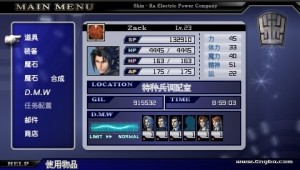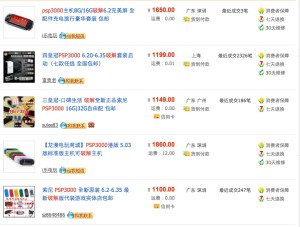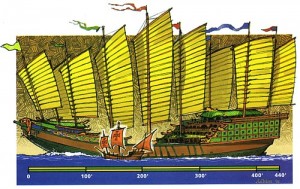
A Ming ship from the voyages of Zheng He 郑和, utterly dwarfing the European galleon by comparison (insert game piracy analogy here)
Part 2 of 2: On shanzhai products as an object of study
Like Part I, a lot of this is simply my preliminary ramblings on the subject – I still have a lot more research to do (don’t we always), but this is a starting point for me, conceptually and otherwise. I’ve been getting increasingly excited about the market for foreign games in China (both legal and not), and what follows is my first attempt at putting down my early thoughts in a somewhat coherent manner. I’m probably using the term shanzhai too broadly, but I will wait for another day to try and tease the complexities out more clearly.
a. On piracy in China
Piracy of all kinds is rampant in China, as noted in the last post (and as anyone who keeps up with the news, or has set foot in the country, undoubtedly knows). However, simply stating that doesn’t really get us anywhere.
Last week, Gamasutra published a small piece on a report released by the Entertainment Software Association (ESA), which noted that over half of all pirated games come from five watch list countries: Italy, China, Spain, Brazil and France. OK, no huge surprises there, though there’s some quibbling on how the figures were arrived at. I looked at the comments on the article and was curious to see some of the takes on why this might be so. I was aghast when this little gem leapt out at me:
China is not a commerce based country like the U.S. so it won’t adopt our policies.
(I might have choked on my morning tea when I read this for the first time.) Not commerce based? What does that even mean? If one thinks China isn’t commerce based, how in the world does one come to grips with the incredible explosion of development (and all the business deals!) over the past decade – and longer? And that’s ignoring commerce of a less global type, like the little old ladies at the vegetable market wanting to getting the best price on their mountain yams, and passionate bargaining that sounds like it’s about to come to blows at any minute.
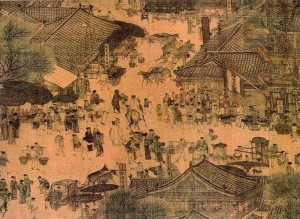
People not conducting commerce in 12th century China. Detail from the Qingming shanghe tu 清明上河图 (Song dynasty), Zhang Zeduan å¼ æ‹©ç«¯
Obviously, I don’t think the issue is commercial failings on the part of Chinese society. An actual “problem” (if we want to call it that), and one that was recently in the news, is the “price is the bottom line” culture that pervades shopping here. Best Buy, the large US retailer, recently shuttered all of its China stores (and by recently, I mean this past Tuesday – after the company denied rumors of closures on Monday). Adam Minter has been discussing the closure over at Shanghai Scrap, and points out that part of the retail giant’s problem was being unable to adjust to the demands of the Chinese electronics market. A market that is “already crowded, highly-competitive and extremely price sensitive ….” Further,
Best Buy didn’t enter China intending to hire talent that knew how to be successful in China. Rather, it entered China intending to create talent that knew how to be successful in North America. That might work very well in Canada, where the retail culture is decidedly service-oriented, but it was going to be a hard, hard road in China where & even Best Buy’s internal studies showed & price was still king for most consumers.
It’s one reason shanzhai products are all over the place, I think. Does it really matter if you have an authentic Nintendo charger, or an “authentic” Nintudo charger? How much is it worth to you? For a lot of customers, spending time haggling with retailers and walking out with a charger that runs a quarter or less of list price in the US is worth that misspelled name on the product (as long as it works – and a lot of it works just fine). Same thing with shanzhai cartridges, DVDs, CDs – well, do they work, or not? And how much would you have paid for the gratification of knowing you had an “authentic” product?** I have a hard time envisioning anyone buying a game at a Chinese brick and mortar store or on Taobao saying the following: “Good heavens! This game I paid a ridiculously low price for is FAKE! I’m marching right back and returning this” (I can imagine consumers raising a big fuss if it didn’t work or wasn’t the game advertised, which are different matters altogether). Many Western gamers, on the other hand, seemed surprised and even affronted if the game they purchased for a ridiculously low price on eBay, for example, is a shanzhai copy – even if it is the game advertised, and it works.
Obviously the problem of piracy and shanzhai products impacts a whole lot more people than the Chinese consumer looking for a good deal at Metro City. It’s big business, both for people pirating and people trying to prevent pirating. The blog PlayNoEvil is dedicated to security issues, piracy, real-money transactions (RMT – the foundation for “gold farming”), and digital rights management (DRM) – a great read if you’re interested in those kinds of issues. As an aside, DRM frequently winds up crippling end users who have legitimately purchased a game, and barely puts a dent in efforts to pirate the games (in fact, pirated versions can work better in many cases, since they’re not hampered with crippling DRM!). Rock, Paper, Shotgun’s John Walker recently posted a great essay on some (very serious) Ubisoft DRM issues, and closed with this:
I have to finish by observing what we all already know, and yet that which the publishers refuse to acknowledge: When your game comes with crippling DRM that prevents someone from legitimately playing it, but a pirated version has all this patched out such that it works as you would wish a product would work, piracy is offering vastly better customer service than you. And therefore your customers, literally unable to use the product you’re selling, will turn to the better offer. At the moment you are charging £35/$60 for a product that is much, much worse than one that can be obtained for free. Please, can you present this information to your shareholders?
b. On piracy and translation
[I will apologize here for my ham-fisted approach to the really complex issues surrounding translation/localization. It’s something that I’ve just recently come to ruminating on, so these are just preliminary thoughts without much background research to back them up. My friend Stephen Mandiberg has been working on translation and localization for quite some time, and he has much clearer, more erudite thinking on the matter(s) than I probably ever will have. You can read his writing and work over at his site, Trans(ference/lation/ition): the movement of cultural texts.]Piracy is one of the most pressing concerns for companies thinking about making an entrance into China – and one reason given for the astonishing lack of Chinese localizations of games. A few notes on game hardware (PlayStation, Xbox, Wii, PSP, etc.) in China. They’re technically illegal and have been since 2000 (Nintendo does market here under the iQue brand, but only the DS is here on the up-and-up – any Wiis for sale have been traveling through the grey market). That doesn’t mean you have to meet people in dark alleys to get your console fix; to the contrary, they’re out and being sold in public quite openly. It does mean that the popular foreign systems aren’t supposed to be here anyways, for the most part, and legitimate games can cost an arm and a leg (or at least as much as you’d pay in the US) – one reason is that they’re being imported through grey market channels.
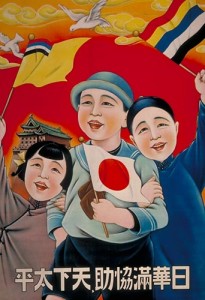
The current situation is not nearly so harmonious as in the halcyon days of the Greater East Asian Co-Prosperity Sphere
Back to piracy and (lack of) localization, and lack of legal availability. Here we have a chicken-or-egg problem. What came first? I have no idea, but it’s an issue. I’ve heard apocryphal tales that long ago, Nintendo decided “to hell with the Chinese-language market!” when they discovered the Taiwanese government owned a sizable stake in a company dedicated to pirating Nintendo cartridges. Whether or not the story is true is somewhat irrelevant; it neatly encapsulates part of this vicious cycle. Foreign companies don’t want to invest money into product launches, localization, and marketing when the stuff is going to wind up being pirated and sold on Taobao for 6 yuan (and with tacit – or explicit – government approval to boot). And who can blame them? It’s a losing proposition financially.
Which leads me to another part of the produce-pirate-produce cycle. I’ve been on the hunt for (legitimate, non-shanzhai) Chinese language localizations of role playing games (RPGs) for my (legitimate, non-“cracked” – which means they’re not ready to get around any DRM issues) handhelds. I’ve discovered that by and large, they don’t exist. Japanese companies frequently do an “Asian edition” – just another one of the multiple editions that will be part of a global release. Except … not quite. They’re generally the Japanese version of the game – voices, text, menu screens, everything. The only difference is the inclusion of a sheet of instructions in Chinese (and English). For many types of games, this may not be an issue (and for many types of gamers, depending on why they’re playing). But for gamers who don’t read or speak Japanese fluently, partially, or at all, they’re left with a pretty pricey game that they may not be able to fully appreciate (particularly an issue, I think, with games dependent on story – if that’s part of what a gamer is after).
So while there’s the issue of price (pirated stuff is just cheaper – significantly so, especially if it’s free!), there’s also the issue of “You want me to pay how much for a game that’s in another language?”. There is significant time invested by people into making “Chinese editions” (zhongwen ban ä¸æ–‡ç‰ˆ) of games that were never intended to be in Chinese; these are widely available, both as free downloads and for sale very cheaply in stores or on Taobao. I’m not suggesting that piracy would magically go away if every game company suddenly decided to release a Chinese localization of their products – it absolutely wouldn’t. But it is another part of puzzle. Gamers aren’t just snagging pirated copies of English or Japanese releases (though they’re certainly doing lots of that). They’re also acquiring pirated copies that have been translated into Chinese. They’re getting versions of games that literally cannot be purchased legally – they don’t exist.
c. On pirated products as objects of study
The first problem with taking up the topic of pirated products in China is the wide variety of meanings we can attach to “pirated products.” While sorting objects into categories and attaching labels is, of course, problematic – most fledgling China scholars have been hit with the question “Well, what China are you talking about?” at some point or another – it is necessary to lay out exactly what we’re talking about (or try to, at least). I have a couple of categories I’ve been bouncing around; they ignore a lot, but it’s a starting point for me:
- Pirated products in their most basic forms – the DVDs, the copies of Windows operating systems, the games that are simply copies of existing products, the knockoffs of designer brands. In terms of games, I’m particularly interested in what gamers are getting out of the games that have not been translated. In the case of games like massive JRPGs, are they turning to other sources to follow the story along (as many Western gamers who buy Japanese releases wind up doing)? Or is it irrelevant in the face of more important priorities? What are the priorities (beyond ‘Hey, it’s cheap and/or free!’)?
- Pirated products that have been unofficially translated (localized?) – the unauthorized translations of releases that otherwise would only be available in Japanese or English, done by Chinese groups or companies. I’m currently most taken with these “fanlations” – who’s behind them, how they translate them, how the games do on the market in comparison to the same games in languages other than Chinese, how the translators decide on which games to translate, and so on.
- Products infringing on IP, but that aren’t actually copies of anything. The Titanic game I referenced in part 1 of this post would be the best example – it’s definitely based on the movie, but doesn’t fit into the two categories above. I’ve been referring to these types of products as “murkymarket” games in conversations with friends. These are going to be the hardest to track down – the demand is most likely much, much lower than for AAA, foreign-produced titles made for much more current hardware. I think the Final Fantasy VII “demake” (porting a game made for the PlayStation to the NES) would probably fit here as well, though there are aspects that fit into the second category. It’s a “copy” of an existing game, it translates that game into Chinese, but it’s neither a wholesale copy of FFVII for the PS1 or PC, nor is it “only” layering a Chinese translation onto the game as it was published.
- Products that don’t infringe on IP (the fact that one of the most popular subjects for games in Asia – the classic Chinese novel Romance of the Three Kingdoms – is in the public domain probably helps in this case), aren’t actual copies of anything, but somehow aren’t doing anything other than being a poor imitation of World of Warcraft (this is the usual charge leveled at Chinese MMORPGs). This is tricky – it doesn’t really fit with the three categories above (there’s not actual IP infringement), but does fit into shanzhai more broadly, at least if we’re considering these games as “imitations” (with some cosmetic changes) of brand name, foreign products. It’s also a lot more open to interpretation than the obvious examples of piracy. A friend once described the Chinese MMORPG Wanmei shijie 完美世界 (Perfect world, now localized for the English speaking audience) as “WoW with an Asian facelift.” Then again, if we’re going to nail Chinese companies for imitation WoW MMOs of variable quality, we should probably take a hard look at all the Japanese and Western companies that make lousy imitations of big titles in whatever game category. Creators of wannabe Final Fantasy RPGs, I’m looking at you.
Obviously, none of these are exclusive to China – fansubbing/”fanlation” (unauthorized translation), for instance, has a reasonably long history in the US (and elsewhere). However, I’m a China person at heart (back to that whole idea of selfish obsessions!), and furthermore, the issue of the game market in China is a more pressing concern for a lot more people than amateur “fanlations” of niche manga and anime in the US or elsewhere (though it’s no more “legal” than the Chinese translations). It also costs more companies more money.
If one is equipped with Chinese language, handling the second, third, and fourth types of pirated/shanzhai products isn’t going to be a huge issue to deal with, at least linguistically (I confess to struggling a bit with the acquisition of a new vocabulary relating to pirated games, but it’s just a new area I need to familiarize myself with – just like every other research project in Chinese history I’ve ever taken on!). There’s an ethical question that bothers me a bit more, at least in reference to the second type of game (and, depending on how one approaches the subject, the first). The only way to actually get your hands on this stuff is to join the ranks of people acquiring it illegally – either by downloading it off frequently dodgy Chinese websites/torrents, or purchasing cheap copies on websites like Taobao (or heading to your local electronics market). More concerning is the fact that – for the games designed for the PSP and consoles, at least – you’re looking at having to either modify your current system (an easy enough proposition in China) or purchase one that’s already cracked/modded (pojie ç ´è§£).
We’re not talking about doing experiments on humans or animals here, but it does rub me the wrong way that I’ve been cruising Taobao for illegally modified PSPs (so I don’t have to run the risk of potentially fouling up my current, “legal” one) and illegal copies of games in the name of research. Depending on one’s approach, you could bypass this completely – but I’m interested in playing the games (which I have already purchased and played in their English language releases) myself and seeing how the translation has actually been done. Oh, the issues we just don’t have to confront when dealing with archival materials from the ’50s!
As for the question of what to do with shanzhai, pirated goods – well, there’s a million angles one could approach these from. At the moment, I’m personally interested in collecting the “fanlated” games and following discussions along on Chinese forums and sites. But there’s the myriad problems of regulation, government intervention (or lack thereof), the connection to foreign companies, and if one has Japanese language skills – probably a whole wide world of interesting connections to be made and research to be done (both comparative, and in terms of how Japanese companies are approaching the “China problem” – beyond the soundbites we get in English media).
Still, there’s a lot of work I have to do before I’m really ready to start producing actual RESEARCH! on pirated games in China. Up first is fleshing out a taxonomy of shanzhai games – and constantly keeping Andrew Jones’ statement in the back of my head**: we need to keep thinking about how all parties involved “have been and continue to be inextricably bound up in a larger and infinitely more complex process.” It’s not just about Chinese knockoffs and illegal fanlations; it’s about the global circulation of media. I sometimes like to retreat to the safe place of “China-centered,” and forget that one can keep one foot firmly in the Middle Kingdom while speaking to the much, much bigger picture.
* It is probably worth dwelling on notions of ‘authenticity,’ and deeper – and older – perceptions on what that means. I’ve been thinking about this in regards to painting in particular, but it seems that it might provide one way of considering more contemporary issues and concerns from a longer term, more historicized perspective. (back)
**A Chinese friend recently described Yellow Music as a 神奇书 (shenqi shu) – a magical or miraculous book. It’s been one of my favorite and most relied upon tomes, and I think 神奇 is a wonderful description for it. It is a rare work that can be applied so usefully to so many subjects.

